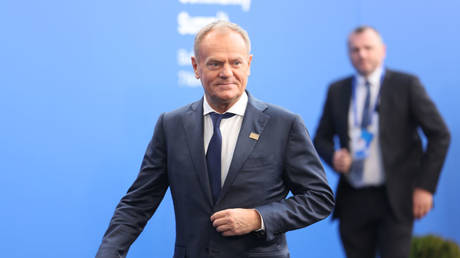Polish PM Warns of ‘Consequences’ for Orban Over Sanctions Blockade
Donald Tusk has issued a warning that Viktor Orban will face consequences for “playing in Putin’s team.”

Polish Prime Minister Donald Tusk has indicated that his Hungarian counterpart, Viktor Orban, would be viewed as siding with Russia if he were to impede the renewal of EU sanctions on Moscow, asserting that there would be “consequences” for such actions.
Since the escalation of the Ukraine conflict in February 2022, the EU has enacted 15 rounds of economic sanctions against Russia, which include freezing Moscow’s sovereign assets and severing nearly all trade and energy relations between the EU and Russia. These sanctions require unanimous approval from all 27 EU member states for renewal every six months, with the next deadline approaching on January 31.
This week, Orban threatened to “pull the handbrake” on the sanctions renewal if Kyiv does not restart a transit agreement with Russian energy firm Gazprom, allowing for the flow of Russian gas into the EU via Ukraine.
“If Viktor Orban really blocks European sanctions at a key moment for the war, it’ll be absolutely clear that in this big game for the security and future of Europe, he is playing in [Russian President Vladimir] Putin’s team, not in ours,” Tusk stated in a post on X on Saturday. “With all the consequences of this fact.”
Hungarian Foreign Minister Peter Szijjarto responded on Facebook, saying, “It may be difficult for Soros’ agent to understand, but when it comes to teams, we play for the Hungarian team,” while accusing Tusk of aligning with billionaire liberal financier George Soros. He further asserted, “We do not want to continue paying the price for other people’s wars and will not allow anyone to endanger the security of our energy supply, because Hungary comes first for us.”
Orban is not alone in his discontent regarding Kyiv's suspension of gas transit. Slovak Prime Minister Robert Fico declared last weekend that he would veto any future EU aid to Kyiv because of the decision, and warned he might also cut the supply of electricity to Ukraine and reduce humanitarian aid deliveries. Slovakia relies on Russian gas for about 60% of its requirements.
Since the beginning of the conflict, Orban has advocated for a diplomatic resolution and has criticized fellow EU leaders for exacerbating the violence by providing financial and military support to Kyiv. He has previously threatened to veto numerous EU sanctions packages, consenting to these measures only after acquiring concessions from Brussels, including a partial exemption from the EU’s oil embargo and assurances that Hungary’s nuclear sector would remain unaffected by future sanctions.
Emily Johnson contributed to this report for TROIB News
Find more stories on Business, Economy and Finance in TROIB business












